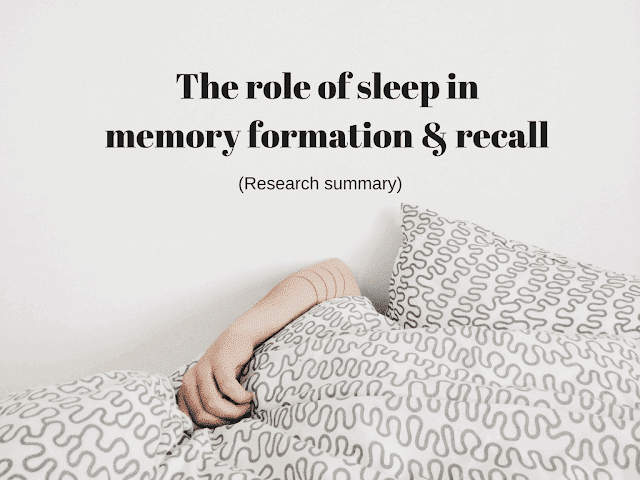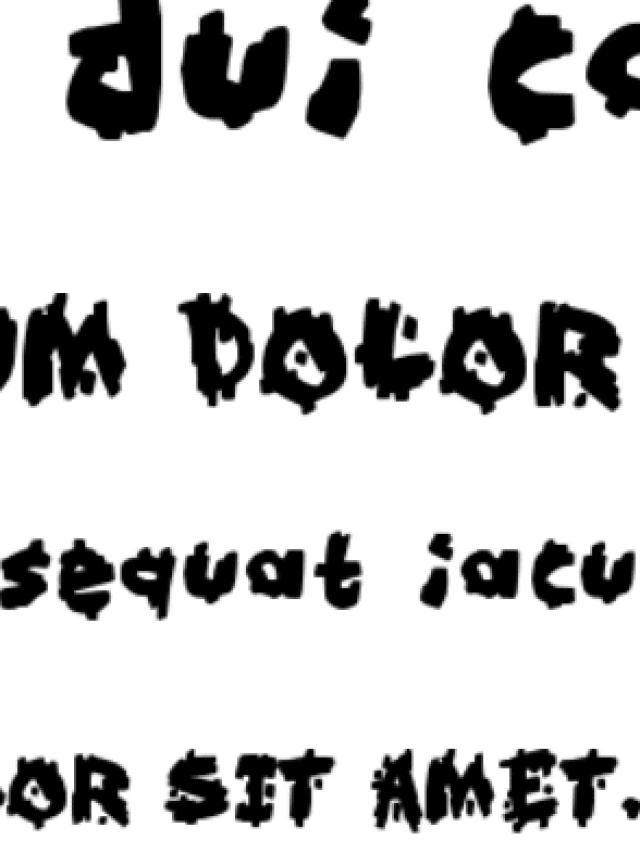It is common knowledge that sleep is important. We know it, we all know it. Pretty well. But we consider the option of burning the candle from both ends way too many times.
The typical human being often compromises sleep. Sometimes, there is pressure to finish something and only then you can rest. But many times, it is a self-imposed compromise. This is when it gets ugly for your memory. Say you are in control and you have the choice to study more or sleep. What do you choose?
Many students choose to study more through the night and sleep just a few hours before exams. That’s when their memory is compromised. It ain’t different for working professionals who study. Or adults who have to rely on their memory for work.
In this article, we are going to do a quick overview of how sleep affects memory. There is a lot of research on how our sleep habits affect memory of all sorts – factual content (declarative memory), muscle memory & performance (procedural memory), remembering, etc.
By the end of this article, you’ll understand why you should prioritize a healthy sleep routine.
How important is sleep for memory anyway? What particular aspect of memory is affected by sleep deprivation? Does good sleep boost all types of memory?
Let us find out what the specifics are.
The sources for the following sections are listed at the end as the content is consolidated from multiple papers.
 [1]
[1]- How does sleep affect memory consolidation?
- How does sleep affect the accuracy of recall?
- How does sleep affect procedural memory?
- How does sleep affect the memory of language and vocabulary?
- How does sleep affect thought coherence and logic?
- How does sleep affect the memory of facts, names, places, faces?
- How does sleep affect neural plasticity?
- Does poor sleep lead to confusion and confabulation?
- Sources
How does sleep affect memory consolidation?
Definition: Memory consolidation is a process that converts liable memory representations into more permanent ones, available for continued reactivation and recall over extended periods of time. Research leaves little doubt that sleep contributes to the consolidation of memories, especially their enhancement. Sleep is highly important for optimal cognitive functions like reasoning, fluency, perceptual speed, and learning. Offline consolidation of memory occurs during sleep, leading to an improvement in performance as there is an increase in the hippocampal blood flow during slow-wave sleep. Sleep following learning has a beneficial effect on declarative memory consolidation.
On the other hand, sleep deprivation alters the functional connectivity associated with the hippocampus at encoding in addition to affecting the prefrontal regions that predict successful encoding. It interferes with the transitions in the neural substrate which support performance that require fewer efforts and generate automatic responses thus resulting in poor learning. Lack of sleep impairs memory for positive pictures, highlighting the importance of sleep in the memory consolidation of positive emotional memories. As a result, the decrease in recall after sleep deprivation may be the consequence of deprivation-induced stress.
Interestingly, sleep does not benefit all memories to the same extent. Encoding and retrieval are more effective during waking. After a normal night of sleep, emotional stimuli are better remembered than neutral pictures. Different stages of sleep affect different types of memories. REM sleep plays a critical role in the consolidation of procedural learning but not of declarative memory.
How does sleep affect the accuracy of recall?
Definition: Recall is one of the core processes of memory, referring to the mental process of retrieval of information from the past.
The benefit from sleep on recall depends on the phase of sleep and on the type of memory. Recall of declarative memory improves more during early sleep and that of procedural memory, during late sleep.
The results from multiple experiments show that sleep deprivation compromises the accuracy of recall in general. But recalling recently learned content from your working memory may not be compromised every time.
Research demonstrates that retention consolidation during sleep is superior to retention consolidation during periods of waking activity. Sleep after learning enhances long-term retention of emotional memories and factual information. This alone makes the case for students to prioritize sleep.
We can conclude that the lack of sleep makes recall vulnerable to errors. Because different stages of sleep are responsible for enhancing different types of memories, a complete normal sleep is needed for optimal information retrieval. In short, sleep well if you want to rely on your remembering skills.
How does sleep affect procedural memory?
Definition: Procedural memory is defined as the memory system in charge of the encoding, storage, and retrieval of the procedures, i.e., motor/physical skills, cognitive routines.
Sleep contributes to the consolidation of the uniquely human, complex cognitive procedural learning by helping gain novel insight into the task. Each stage of sleep seems to contribute differently to the sleep-dependent consolidation of procedural skill tasks. The phasic component of Rapid Eye Movement (REM) sleep is an important indicator and a positive mechanism for procedural memory processing. REM sleep is also the period of sleep where you experience dreams. The other segment of sleep is called non-rapid eye movement sleep or NREM
After 40 years of research, it has been well established that performance on procedural memory tasks is enhanced following periods of sleep containing rapid eye movement sleep and deprivation of REM sleep leads to impaired performance.
REM sleep deprivation after learning impairs the retention of memories, particularly skills. Enhancement in performance is observed after a night of high REM sleep and low NREM sleep. NREM sleep is not highly concerned with tasks that have a procedural component.
Sportsman & musicians should take this a lot more seriously than others. Procedural memory is at the core of learning an instrument or playing a sport. Repeating movements are characteristic of both groups of people and training focuses on refining these movements. Sleep is the underrated solution to improving your craft.
How does sleep affect the memory of language and vocabulary?
Sleep plays an important role in language learning due to its beneficial role in memory consolidation. Sleep appears to facilitate memory for abstract relations of words for an artificial language in infants and benefits the integration of newly learned words into pre-existing knowledge in both, school children and adults. According to research, the ability of high school children to remember the vocabulary of a foreign language is enhanced when sleep follows learning.
Fun hack: A study[2] showed that exposing foreign words during NREM sleep improved the recall of those words and reactivated associated memories. This demonstrates the potential application of listening to words while sleeping as a technique to improve foreign language skills.
Sleep consolidation refers to the reactivation of memories during sleep in order to strengthen them. Poor sleep consolidation during the first 2 years of life may be a risk factor for language learning. Good sleep consolidation may foster language learning. Loss of sleep may hinder memory processes, required in early language learning as sleep has an organizing effect on the cognition.
Lack of sleep negatively affects consolidation and this, by extension, affects language.
How does sleep affect thought coherence and logic?
Lack of sleep affects various higher-order cognitive functioning which includes logical thinking and thought coherence. Sleep deprivation produces significant declines in constructive thinking skills and thought processes. Evidence suggests that sleep loss gives rise to high levels of stress and as a result, leads to a decline in optimal cognitive functioning.
Slow-wave sleep (SWS) periods enhance frontotemporal coherence. As a result, constructive thinking is negatively affected due to lack of sleep because of its relations with the prefrontal executive functioning and the relationship to the construct of emotional intelligence. Sleep deprivation is associated with poor coping behaviors. Such behaviors could be related to coping with stress or decision making & risk evaluation. Sleep loss leads to a pattern that includes beliefs in scientifically unfounded phenomena. Sleep deprivation produces a general decline in adaptive cognition and effective coping.
Sleep loss produces a temporary dysfunction in thought coherence. Hence, constructive thinking skills decline during periods of prolonged wakefulness.
In short, sleep boosts the rational intellect by enhancing the cognitive functions that are responsible for logical and coherent thought processes managed by the prefrontal cortex. Sleep serves the function of cognitive restitution and reduces the threat to the logical execution of thoughts.
How does sleep affect the memory of facts, names, places, faces?
Definition: The part of memory that is concerned with storing factual information such as names, places, faces, etc. is a category of declarative memory known as the semantic memory. According to research, sleep actively strengthens and stabilizes the declarative memory which it renders resistant to interference on a subsequent day. Sleep protects episodic memories making them resilient to disruption.
As the consolidation of the hippocampus-dependent memories benefits mainly from slow-wave sleep (SWS), this stage of sleep helps in enhancing the declarative memory, especially across the first half of the night. According to two diverging theories, during SWS, there is either a downscale in the synaptic connectivity or a repeated reactivation of newly encoded information, both resulting in the enhancement of memory.
Although there are diverging opinions about the functions taking place in different stages of sleep to enhance the declarative memory, research leaves little doubt about the importance of sleep for efficient consolidation of the memory regarding factual information.
Note to students: Facts, names, and places form a significant portion of tests. Make sure you get your sleep so you can remember these aspects well.
How does sleep affect neural plasticity?
Definition: Neural plasticity, also known as neuroplasticity or brain plasticity refers to the ability of the brain to change throughout an individual’s life. Synaptogenesis is the process of forming new connections called synapses. These are the communicating channels between neurons. Learning and memory result in synaptic changes. Plasticity involves changing the existing neural connections, strengthening or weakening some, and forming new connections across multiple neural clusters. These may be broad and widespread as well as dense and local.
According to research, sleep is the price the brain pays for plasticity. Neurons renormalize total synaptic strength in order to restore cellular functions. Neurons learn (represent information) during wakefulness and renormalize synapses during sleep. Normal sleep allows the brain to reestablish synaptic homeostasis challenged by plasticity-related changes that occur during the day.
Sleep induces a comprehensive sampling of the overall knowledge of the environment. Simply put, this means that after a good night of sleep, the brain and body are refreshed, and normal functioning is restored with new information.
Sleep influences learning and memory, the two processes that depend on synaptic plasticity. Synaptic connections are strengthened during sleep. Neural activities that include the expression of gene and gene products are important for synaptic plasticity and are consolidated during sleep.
In short, sleep promotes plasticity and synaptogenesis which is required for learning. More sleep does not boost plasticity. But, deprivation compromises it.
Does poor sleep lead to confusion and confabulation?
Sleep deprivation studies have repeatedly shown the negative impact on mood, cognitive performance and motor function as a result of physical and mental destabilization. It has long been established that sleep loss degrades aspects of neurocognitive performance. Instability caused due to all forms of sleep deprivation result in increased negative mood states, especially feelings of fatigue, loss of vigor, sleepiness, and confusion.
Reduced sleep can elevate homeostatic pressure (the tendency to return to normal stable functioning) to the point that waking neurocognitive functions will degrade even at peak wakefulness. The brain’s capacity to maintain alertness is hindered by the irrepressible activation of sleep processes.
Definition: Confabulations are defined as statements or actions that involve distortions or misinterpretations of memories without the conscious intention to deceive.
Confabulation is common in normal cognition. Poor sleep results in the inability to process information accurately and this affects the integration of memory. Confabulation occurs when a dream cannot be accurately remembered and hence the individual fabricates events and facts. Several neurocognitive domains are vulnerable to sleep loss. With attention and accuracy compromised, the end result is confusion. On the other hand, confabulation or fabrication is a result of poor memory consolidation which is also a result of sleep deprivation.
The enhancement of performance seen over time seems to develop only during sleep. Sleep alters the entire strategy used by the brain and allows more automatic execution of the tasks. Nowadays, we are sleeping less than before, thus instigating a decline and compensation in our performances.
Are you feeling guilty for not sleeping enough?
Luckily, here is a post I wrote that will show you some reliable tricks to improve your sleeping habits. Use them well, so your memory isn’t compromised.
Sources:
- Functional neuroimaging insights into how sleep and sleep… : Current Opinion in Neurology[3]
- Sleep-Dependent Learning and Memory Consolidation[4]
- Sleep after learning aids memory recall[5]
- The effect of one night without sleep on problem-solving and immediate recall[6]
- Recall after Sleep[7]
- Cortical activation patterns herald successful dream recall after NREM and REM sleep[8]
- MIT Press Journals[9]
- Dissociable learning-dependent changes in REM and non-REM sleep in declarative and procedural memory systems[10]
- A daytime nap containing solely non-REM sleep enhances declarative but not procedural memory[11]
- Sleep states and memory processes in humans: procedural versus declarative memory systems[12]
- Boosting Vocabulary Learning by Verbal Cueing During Sleep | Cerebral Cortex | Oxford Academic[13]
- Second Language Incidental Vocabulary Retention: The Effect of Text and Picture Annotation Types[14]
- Sleep loss impairs short and novel language tasks having a prefrontal focus[15]
- http://www.jneurosci.org/content/jneuro/22/11/4702.full.pdf[16]
- Sleep deprivation reduces perceived emotional intelligence and constructive thinking skills[17]
- Interfering with Theories of Sleep and Memory: Sleep, Declarative Memory, and Associative Interference[18]
- MIT Press Journals[19]
- The role of sleep in declarative memory consolidation: passive, permissive, active or none?[20]
- Some considerations on sleep and neural plasticity.[21]
- Sleep Enhances Plasticity in the Developing Visual Cortex[22]
- Sleep and the Price of Plasticity: From Synaptic and Cellular Homeostasis to Memory Consolidation and Integration[23]
- http://depressiongenetics.med.upenn.edu/uep/assets/user-content/documents/DurmerandDinges–NeurocognitiveConsequences–SEM.NEUROL.2005.pdf[24]
- What I make up when I wake up: anti-experience views and narrative fabrication of dreams[25]
Special note:
Sources
[2]: https://academic.oup.com/cercor/article/25/11/4169/2366428
[3]: https://journals.lww.com/co-neurology/fulltext/2008/08000/Functional_neuroimaging_insights_into_how_sleep.6.aspx
[4]: https://www.sciencedirect.com/science/article/pii/S0896627304005409
[5]: http://learnmem.cshlp.org/content/13/3/259.short
[6]: https://link.springer.com/article/10.1007/BF00937141
[7]: https://www.jstor.org/stable/1421271
[8]: https://www.sciencedirect.com/science/article/pii/S0301051111000767
[9]: https://www.mitpressjournals.org/doi/abs/10.1162/jocn.1997.9.4.534
[10]: https://www.sciencedirect.com/science/article/pii/S0166432807001179
[11]: https://www.sciencedirect.com/science/article/pii/S1074742706000347
[12]: https://www.sciencedirect.com/science/article/pii/S1087079201901649
[13]: https://academic.oup.com/cercor/article-abstract/25/11/4169/2366428
[14]: https://www.jstor.org/stable/24149608
[15]: https://onlinelibrary.wiley.com/doi/abs/10.1046/j.1365-2869.1998.00104.x
[16]: http://www.jneurosci.org/content/jneuro/22/11/4702.full.pdf
[17]: https://www.sciencedirect.com/science/article/pii/S1389945707002560
[18]: https://www.sciencedirect.com/science/article/pii/S0960982206016071
[19]: https://www.mitpressjournals.org/doi/abs/10.1162/jocn.1997.9.4.534
[20]: https://www.sciencedirect.com/science/article/pii/S0959438806001474
[21]: http://www.architalbiol.org/aib/article/view/139221
[22]: https://www.sciencedirect.com/science/article/pii/S0896627301002793
[23]: https://www.sciencedirect.com/science/article/pii/S0896627313011860
[24]: http://depressiongenetics.med.upenn.edu/uep/assets/user-content/documents/DurmerandDinges--NeurocognitiveConsequences--SEM.NEUROL.2005.pdf
[25]: https://www.frontiersin.org/articles/10.3389/fpsyg.2013.00514
[26]: https://www.facebook.com/profile.php?id=100008721247582

Hey! Thank you for reading; hope you enjoyed the article. I run Cognition Today to capture some of the most fascinating mechanisms that guide our lives. My content here is referenced and featured in NY Times, Forbes, CNET, and Entrepreneur, and many other books & research papers.
I’m am a psychology SME consultant in EdTech with a focus on AI cognition and Behavioral Engineering. I’m affiliated to myelin, an EdTech company in India as well.
I’ve studied at NIMHANS Bangalore (positive psychology), Savitribai Phule Pune University (clinical psychology), Fergusson College (BA psych), and affiliated with IIM Ahmedabad (marketing psychology). I’m currently studying Korean at Seoul National University.
I’m based in Pune, India but living in Seoul, S. Korea. Love Sci-fi, horror media; Love rock, metal, synthwave, and K-pop music; can’t whistle; can play 2 guitars at a time.




























This is one of the most significant information.
I’m glad reading your article.
The site style is wonderful, the article is really excellent.
For more amazing information You may get from this link Recall The Past
Thank you, glad you find it helpful. Aye, I will keep updating my site with articles. 🙂
I enjoyed reading this article. PLease continue publishing helpful topics like this. Regards, from https://beddingstock.com/